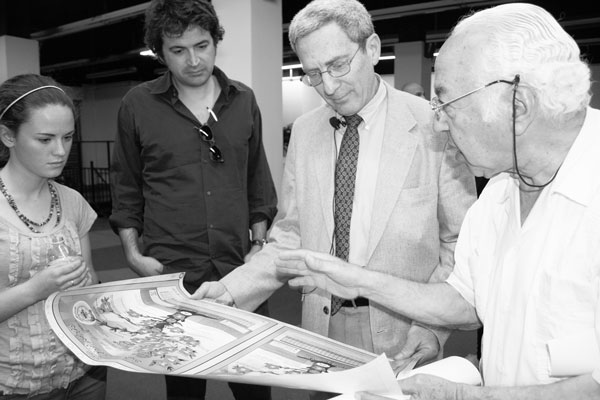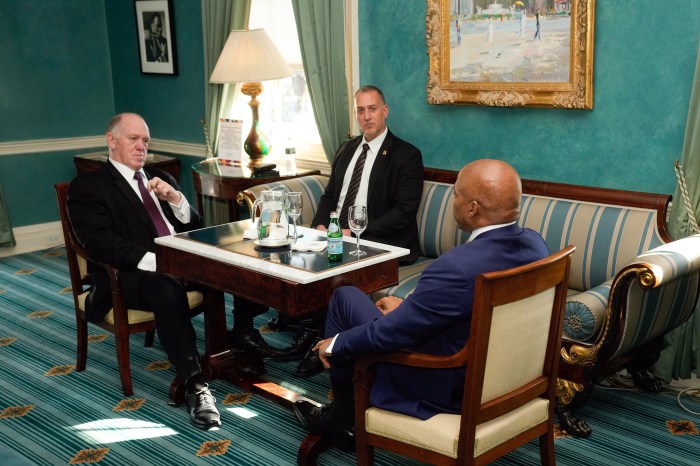
BY ALINE REYNOLDS | Muslim and Western cultures are more similar than most people realize, according to author and illustrator Bryn Barnard, who recently gave a lecture at 51 Park Place, the future home of the Park51 Community Center. In fact, many aspects of contemporary Western civilization stem from medieval Islamic culture, he said.
Barnard delivered a visual presentation of Islam’s cultural innovations dating back to A.D. 600, many of which, he asserted, are the building blocks of 21st century Western society.
“The books we read, the music we play, the words we speak, the numbers we count, the clothes we wear, the food we eat, the science we depend on — all were shaped, at least in part, by Islam,” according to Barnard. The lecture was part of Barnard’s international tour to promote his book, “The Genius of Islam: How Muslims Made the Modern World.”
Arabic numerals, for example, originated in India in the fifth century A.D. and quickly spread across Muslim nations, Barnard said. Europe later adopted this decimal system, which enabled the creation of modern-day accounting and computations. Similarly, the Islamic world invented the initial versions of many Western musical instruments, including the keyboard, the drum, the violin and the horn.
The crank-and-connecting rod used in modern-day wheels originated in the Islamic world, as did techniques for growing tropical and other foods, irrigation systems and even hospitals. Members of the Islamic faith also developed observatories that enabled them to calculate the movements of stars, enhance the science of optics and create distinctive architecture. Intricately patterned embroidered cloth and pottery designs also originated in medieval Islam, as well as navigational instruments, expanded forms of pharmacology and more efficient communication methods.
The use of paper is also rooted in Muslim culture: The Chinese invented paper sometime before the second century B.C.; Muslims learned to make it when Islam spread to Central Asia in the eighth century A.D. Under its influence, over the next two centuries, books and libraries became widespread in Central Asia.
It is also hypothesized that Arabic and pseudo-Arabic (decorative calligraphy that looked like Arabic writing but had no meaning) influenced the evolution of the Latin alphabet. Ibn Sina, an 11th-century Persian known to Latin Europeans as Avicenna, and Ibn Rushd, a 12th-century Arab whose European name was Averroes, preserved and interpreted Aristotle’s writings and helped Europeans understand the work of the ancient Greek philosopher and other writers of the classical world.
Many of these inventions were forgotten, however, starting in the 16th century, when, according to Barnard, Europe set out to purposely negate its Islamic heritage and Muslim contributions became overshadowed by Western culture.
The Islamic faith was founded by Muhammad ibn Abdallah, an Arabian merchant from Mecca, which became Islam’s holy city. By 630 A.D., Muhammad and his followers had united all of the Arabian Peninsula under Islam. The empire expanded from Spain to China in the centuries that followed before it broke up into subcultures. It helped inspire the science and optics of the European Renaissance, with continuing effects on our culture today.
“You can agree or disagree with Islam as a religion, but that doesn’t change the fact that Islam as a civilization has had an enormous positive impact on the West,” said Barnard. “Without Islamic civilization… a lot of knowledge of the classical world would have been lost forever.”
Barnard hopes Park51 can use his book as a tool to educate local youths and bridge cultural and religious gaps among community members. “The more open and transparent people are with each other about history, the better we can understand our faiths and where we are,” said Barnard.
Park51 will host an Islamic event at the end of the month, details of which will be posted on its website, park51.org, in the coming days.





































